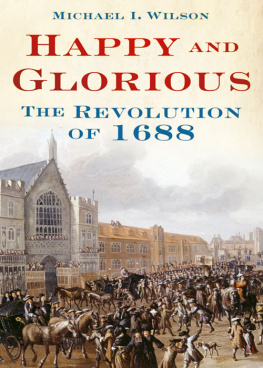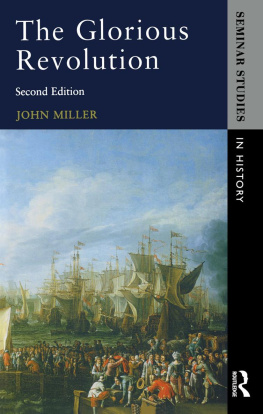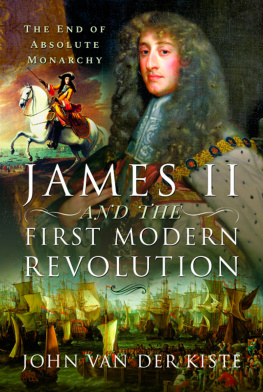
C ONTENTS
After a promising start to his reign early in 1685 King James II turned out to be dictatorial, devious, and intent on getting his own way in everything. He believed firmly in his Divine Right to rule, and as a fanatical Catholic he wanted above all to reinstate his own faith as the official religion of the nation. As for Parliament, to him it was simply an irritation, little more than a supply depot to which he was obliged to go whenever he needed money. The Glorious Revolution of 1688/89 changed all this. It was a milestone in the progress towards Parliamentary democracy in Britain, and its outcome was far-reaching. The principle of the Divine Right of Kings, the cause of so much trouble under all the Stuart monarchs, was finally discredited. For the first time in the history of these islands the reigning monarch became answerable to Parliament over a wide spectrum of policies. No longer could he (or she) embark unchecked on expensive foreign adventures or wage unpopular wars. No longer could he try to impose religious beliefs on his people, or interfere with the work of the judiciary. No longer could he set up a standing army with personal allegiance to himself. Perhaps even more remarkably, all this and more was achieved without the widespread bloodshed and strife which at one time had seemed inevitable.
Michael Wilson guides us through this momentous period with clarity and precision. I feel sure that his highly readable account will help greatly towards making this somewhat neglected yet immensely significant episode in our island history better known to students and general readers alike.
Jack Straw, 2014
Three hundred years ago the Stuart monarchy came to an end with the death of Queen Anne on 1 August 1714. Yet it could so easily have ended sooner, amidst the violence and bloodshed of a civil war. Instead events took a different course, culminating in the Glorious Revolution of 168889.
Over the years historians have produced many books and articles about the Revolution, yet to many people it remains something of a mystery. What started it, why was it Glorious, and what was it all about anyway? Who were the principal figures involved? In their spoof history book 1066 and All That (1930), W.C. Sellar and R.J. Yeatman manage in their own inimitable way to sum up the entire episode in a few words, telling us that because of James IIs behaviour, the people lost control of themselves altogether and declared that the answer was an Orange. The accompanying illustration shows an orange topped by a crown and labelled Williamanmary.
There is clearly much more to the Revolution than this indeed so much more that one reason why the subject often seems so daunting may be the number and complexity of the issues involved, whether religious, political, social or personal. It is the aim of this book to try to simplify these issues and so to make plain both to students and to the general reader the main underlying causes of the Revolution the seeds of which were sown in the previous reign as well as charting its progress. It is not the intention either to take sides or to propose new theories, but simply to follow events as they unfolded. In the process it may be that not all the participants have received the attention due to them, and that some lesser events have been omitted. Nevertheless, if at the end of the journey the reader gains a clearer sense of what actually happened and why, the book will have served its purpose.
My thanks are due to the following for permission to quote from material within their copyright: HarperCollins Publishers Ltd ( The Diary of Samuel Pepys ed. R.C. Latham and W. Matthews), and Batcheller Monkhouse on behalf of the Trustees of the Will of Major Peter Evelyn ( The Diary of John Evelyn ed. E.S. de Beer). I also thank my publishers, and especially Mark Beynon, for the care they have taken with the production of this book. And I am grateful beyond measure to all those who between them, during the writing process, have freely given me generous portions of their time and patience, moral support and encouragement, and have shared with me much valuable technical expertise and historical knowledge.
The political and constitutional upheaval which is the subject of this book is usually known as the Glorious Revolution. How it got this title is less certain, but one explanation has more credibility than most.
In 1689 the political activist John Hampden was summoned to appear before a committee of the House of Lords which was enquiring into the repercussions of the Rye House Plot. There are differing reports of the proceedings, and while one of these links Hampden with the phrase this glorious Revolution, the official account of the committee records it as this most happy Revolution. It is not entirely clear from these reports whether Hampden actually used the words himself. Although the first version has become the norm, the second clearly has an equally important claim to recognition and use. Both are therefore reflected in the title of this book, although the Glorious Revolution is the term generally used in the text.
Sources: Journal of the House of Lords, vol. XIV, p. 379; H.C. Foxcroft (ed.), The Life and Letters of Sir George Savile, Bart., first Marquess of Halifax , 2 vols, 1898, vol. II, p. 95; information from Adrian Brown, House of Lords Library.
Although the Gregorian or New Style calendar had been in use throughout most of Western Europe since 1584, the Julian or Old Style version continued to be used in Britain until 1752. In this mode the New Year officially began not on 1 January but on 25 March, the interim period forming the last three months of the previous year instead of the first three of the following year. However, in this book the New Style calendar is applied throughout and 1 January is indeed New Years Day.
To complicate matters further, British Old Style dates are eleven days behind those of the New Style. Where necessary, this discrepancy is indicated in the text by (OS) or (NS).
I t was 6 February 1685. In his bedroom overlooking the Thames, in the rambling old Palace of Whitehall, King Charles II lay dying. In common with the other private apartments in the Palace, the room was not grand but quite small and dark; now it was also noticeably stuffy, owing to the crowd of churchmen, courtiers, officials and servants who had pressed their way in to witness their kings last hours. With typical irony he begged their collective pardon for taking such an unconscionable long time a-dying, and faintly voiced a plea on behalf of his best-known mistress Nell Gwynn which today is no less poignant for being so familiar dont let poor Nelly starve!
Four days earlier, on 2 February, Charles had been unexpectedly laid low by a stroke. He had already suffered one in 1681 which, while not incapacitating him, had certainly taken its toll. From then onwards he spent more time away from London, mainly at Newmarket or Windsor, enjoying hawking, racing and theatricals. His relationships with his various mistresses grew less tempestuous, and he became absorbed in new building projects at Whitehall, Greenwich and Winchester. However, at New Year 1685 there was no sign of any impending crisis. Indeed, on the evening of Sunday 25 January the diarist John Evelyn, on a visit to Whitehall, was scandalised to find the king publicly toying with no less than three of his mistresses (Barbara Palmer, Duchess of Cleveland, Louise de Kroualle, Duchess of Portsmouth, and Hortense Mancini, Duchess of Mazarin), whilst around him his roistering courtiers gambled away huge sums of money.
And now, for the pleasure-loving, politically devious Charles, such scenes of unashamed debauchery were over. As he lay patiently waiting for death whilst enduring the various drastic treatments prescribed by his doctors, his queen the Portuguese Catherine of Braganza, originally a neglected and slightly pathetic figure sent word that she was too upset to visit him and asking his forgiveness for anything she might have done in the past to distress or offend him. (If ever there was a case of the boot being on the other foot, this was surely it.) In contrast, his brother James, Duke of York and heir to the throne, scarcely left the bedside where he knelt weeping continuously. It could be said that his tears, though certainly genuine, were also prophetic, in view of the distress and misery that he was not only about to suffer himself, but would also inflict upon many of his subjects. Before setting out to trace the steps which led to this sad state of public affairs it may be rewarding, in these first chapters, to consider the main events of James earlier years, as a means of evaluating his developing character.
Next page







